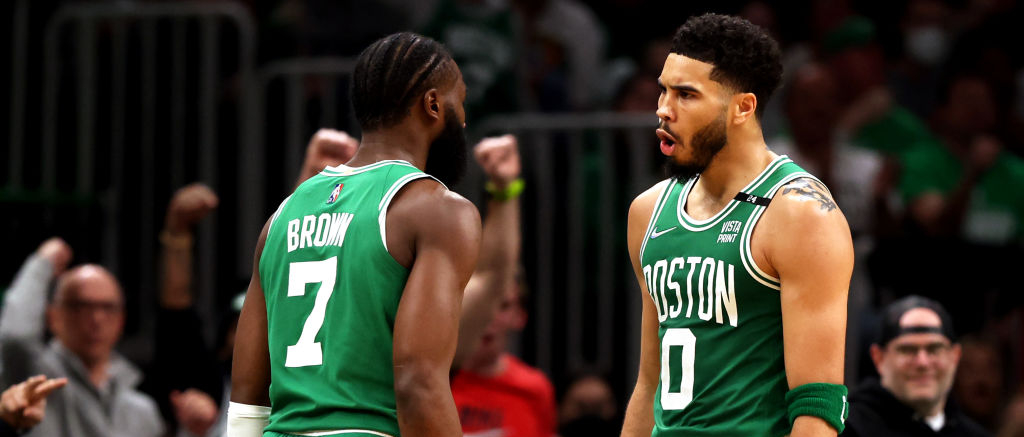
The Boston Celtics were extremely aggressive this offseason in seeking out roster upgrades on the trade market after a disappointing Eastern Conference Finals loss to the Miami Heat.
Recognizing the need to have a more dynamic offense, they traded Marcus Smart to Memphis as part of a three-team deal to land Kristaps Porzingis, adding the kind of frontcourt scoring threat they have not had in the Jayson Tatum and Jaylen Brown era. However, giving up Smart meant getting rid of one of their top perimeter defenders, and when Jrue Holiday came available after the Bucks traded for Damian Lillard, they sent Robert Williams III and Malcolm Brogdon to Portland to add his services.
The result is one of the best starting lineups in the NBA, with a robust six-man rotation featuring Brown, Tatum, Holiday, Porzingis, Al Horford, and Derrick White, offering Joe Mazzulla flexibility to go big or small as he sees fit based on opponent. The moves made Boston the co-favorites to win the NBA title this year alongside the Bucks. To get there, health is a necessity, particularly with regards to Porzingis who has had his fair share of injuries in his career. However, health is a concern for every team looking to win at title, so we want to focus on the big question beyond health facing the Celtics this season, as well as the player who figures to hold the keys to them reaching their goals.
Biggest Question: How Big Is The Drop-off With The Bench Unit?
The top-6 in Boston is arguably the best in the league, but the rest of the bench is less of a certainty. Boston won’t need its bench unit to be great, but they will need to have enough production to simply not give up the advantage they figure to have most nights with the starting lineup. How Mazzulla staggers his starters will be interesting to watch, as he could completely avoid running out full bench units (or lineups with just one starter), but in doing so there is always the tradeoff of having less time on the floor with your absolute best group. As such, there figure to be plenty of regular season games with a more traditional platoon system that feature lineups that feature some combination of (the newly extended) Payton Pritchard, Luke Kornet, Oshae Brissett, Sam Hauser, Jordan Walsh, and others as the majority.
That’s not the most inspiring list of names, but it’s important to remember the goal here isn’t to have one of the league’s best second units, it’s just simply to not be catastrophically bad. We saw a year ago with the Nuggets how a top-heavy team going from having one of the worst bench units in the league to simply being average can change a team’s trajectory. After years of hilarious on/off splits for Nikola Jokic, Denver was able to basically be a net neutral in the postseason without their star, which made them a buzzsaw overall. Boston has the chance to be the same type of squad if this bench can figure out how to be a fairly average group. If they struggle to do so, Mazzulla will have to do more tinkering with staggering starters and have fewer minutes featuring the full starting group, which takes away some of what makes this team so terrifying on paper.
X-Factor: Playoff Jrue Holiday
You could go in a number of directions here, as Porzingis is going to be heavily relied on, but my concerns there are more about health than how he fits in. What I am fascinated by is how Holiday fares once the Celtics get to the playoffs, because in Milwaukee he was always sensational on defense but struggled to be an efficient scorer when the postseason rolled around. In 40 playoff games with the Bucks (including the title year), Holiday shot just 39.2 percent from the field and 30.4 percent from three on nearly 18 shots per game. Being that inefficient on high volume is not what you want out of your lead guard, and I want to know how much of that was circumstance in Milwaukee and how much of that will carry over in Boston.
Holiday’s skills as a distributor and creator for others should be a huge help to a Celtics team that can bog down in the halfcourt, provided Holiday leans into that role. With the Bucks, he would go on some wild adventures on the ball, dribbling into bad shots and contributing to Milwaukee’s halfcourt issues in the postseason rather than relieving them. However, he was on a team that needed someone to do that (which is the biggest reason they traded him for Lillard) and didn’t have as many offensive weapons as this Celtics team does. Tatum, Brown, and Porzingis should be a better offensive fit around Holiday than Giannis, Khris Middleton, and Brook Lopez, particularly because all three are capable of spacing the floor as opposed to just two of them. If that allows Holiday to feel like his job is simply to be a table-setter and secondary scorer, rather than trying to take on the burden of lead shot-creator on the perimeter, then it’s possibly he becomes a more efficient postseason player. That, however, is far from a guarantee given we have a pretty big sample size of what Holiday is as an offensive player in the playoffs.
The most difficult part of this evaluation is, we won’t be able to learn much of anything about it during the regular season, because Holiday is typically fantastic offensively over the 82-game schedule. It’s in the postseason things get sticky, and we’ll just have to wait until April and May to find out if things can be different for him in Boston.
